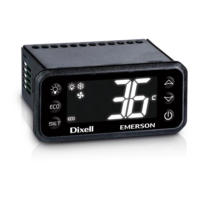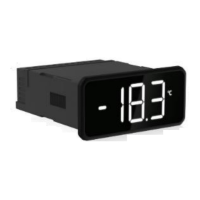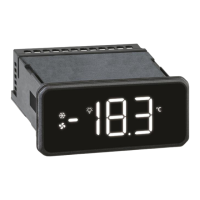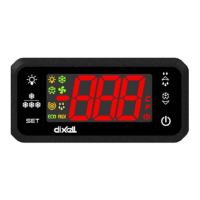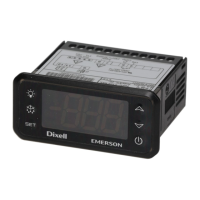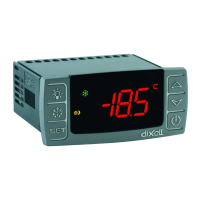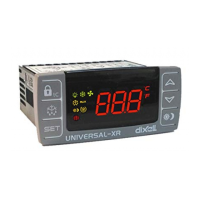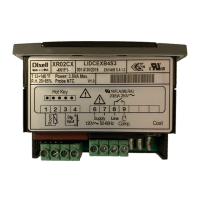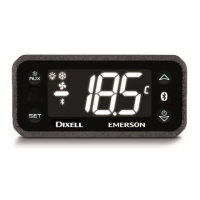1592007201 XR10C-D GB r1.0 18.11.2015 XR10C – XR10D 3/4
8.6 DIGITAL INPUTS POLARITY
The digital input polarity depends on the “i1P” parameter.
i1P=CL: the input is activated by closing the contact.
i1P=OP: the input is activated by opening the contact
9. INSTALLATION AND MOUNTING
Instrument XR10C shall be mounted on vertical panel,
in a 29x71 mm hole, and fixed using the special
bracket supplied.
To obtain an IP65 protection grade use the front
panel rubber gasket (mod. RG-C) as shown in
figure.
Instrument XR10D shall be mounted on an omega DIN rail
The temperature range allowed for correct operation is 060 °C. Avoid places
subject to strong vibrations, corrosive gases, excessive dirt or humidity. The same
recommendations apply to probes. Let air circulate by the cooling holes.
10. ELECTRICAL CONNECTIONS
The instrument is provided with screw terminal block to connect cables with a
cross section up to 2,5 mm
2
. Before connecting cables make sure the power
supply complies with the instrument’s requirements. Separate the probe cables
from the power supply cables, from the outputs and the power connections. Do not
exceed the maximum current allowed on each relay, in case of heavier loads use
a suitable external relay.
10.1 PROBE CONNECTION
The probes shall be mounted with the bulb upwards to prevent damages due to
casual liquid infiltration. It is recommended to place the thermostat probe away
from air streams to correctly measure the average room temperature. Place the
defrost termination probe among the evaporator fins in the coldest place, where
most ice is formed, far from heaters or from the warmest place during defrost, to
prevent premature defrost termination.
11. HOW TO USE THE HOT KEY
11.1 HOW TO PROGRAM A HOT KEY FROM THE
INSTRUMENT (UPLOAD)
1. Program one controller with the front keypad.
2. When the controller is ON, insert the “Hot key” and push o key; the "uPL"
message appears followed a by flashing “End”
3. Push “SET” key and the End will stop flashing.
4. Turn OFF the instrument remove the “Hot Key”, then turn it ON again.
NOTE: the “Err” message is displayed for failed programming. In this case push
again o key if you want to restart the upload again or remove the “Hot key” to
abort the operation.
11.2 HOW TO PROGRAM AN INSTRUMENT USING A HOT KEY
(DOWNLOAD)
1. Turn OFF the instrument.
2. Insert a programmed “Hot Key” into the 5 PIN receptacle and then turn
the Controller ON.
3. Automatically the parameter list of the “Hot Key” is downloaded into the
Controller memory, the “doL” message is blinking followed a by flashing
“End”.
4. After 10 seconds the instrument will restart working with the new
parameters.
5. Remove the “Hot Key”..
NOTE the message “Err” is displayed for failed programming. In this case turn the
unit off and then on if you want to restart the download again or remove the “Hot
key” to abort the operation.
12. ALARM SIGNALS
Compressor output according
to par. “Con” and “COF”
Maximum temperature alarm
Minimum temperature alarm
Serious external alarm (i1F=bAL)
Pressure switch alarm (i1F=PAL)
12.1 ALARM RECOVERY
Probe alarm “P1” starts some seconds after the fault in the related probe; it
automatically stops some seconds after the probe restarts normal operation.
Check connections before replacing the probe.
Temperature alarms “HA” and “LA” automatically stop as soon as the thermostat
temperature returns to normal values and when defrost starts.
Alarms “EA” and “CA” (with i1F=bAL) recover as soon as the digital input is
disabled.
Alarm “CA” (with i1F=PAL) recovers only by switching off and on the instrument.
13. TECHNICAL DATA
Housing: self extinguishing ABS.
Case: XR10C frontal 32x74 mm; depth 60mm;
XR10D 4 DIN modules 70x85 mm; depth 61mm
Mounting: XR10C panel mounting in a 71x29mm panel cut-out
XR10D DIN RAIL mounted in a omega (3) din rail
Protection: IP20.
Frontal protection: XR10C IP65 with frontal gasket RG-C (optional).
Connections: Screw terminal block 2,5 mm
2
wiring.
Power supply: according to the model: 12Vac/dc, ±10%; 24Vac/dc, ±10%;
230Vac 10%, 50/60Hz, 110Vac 10%, 50/60Hz
Power absorption: 3VA max
Display: 3 digits, red LED, 14,2 mm high.
Inputs: 1 NTC or PTC probe.
Digital input: free contact
Relay outputs
compressor: SPDT relay 8(3) A, 250Vac or
SPST relay 20(8)A; 250Vac
Data storing: on the non-volatile memory (EEPROM).
Kind of action: 1B; Pollution grade: normal; Software class: A.
Operating temperature: 0÷60 °C.
Storage temperature: -30÷85 °C.
Relative humidity: 2085% (no condensing)
Measuring and regulation range:
NTC probe: -40÷110°C (-40÷230°F)
PTC probe: -50÷150°C (-58÷302°F)
Resolution: 0,1 °C or 1°C or 1 °F (selectable).
Accuracy (ambient temp. 25°C): ±0,7 °C ±1 digit
14. CONNECTIONS
14.1 XR10C: 8A COMPRESSOR
N.C.
1 2 3 6 7
9 10 11 12
Comp
Room
8
Hot Key
8(3)A250V
Line
12Vac/dc supply: connect to the terminals 7 and 8.
24Vac/dc supply: connect to the terminals 7 and 8.
120Vac supply: connect to the terminals 7 and 8.
14.2 XR10C: 20A COMPRESSOR
4 5 6 7
9 10 11 12
Comp
Room
8
Hot Key
20(8)A250V
Line
12Vac/dc supply: connect to the terminals 7 and 8.
24Vac/dc supply: connect to the terminals 7 and 8.
120Vac supply: connect to the terminals 7 and 8.
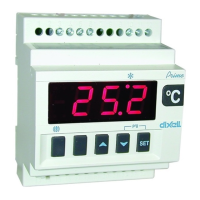
